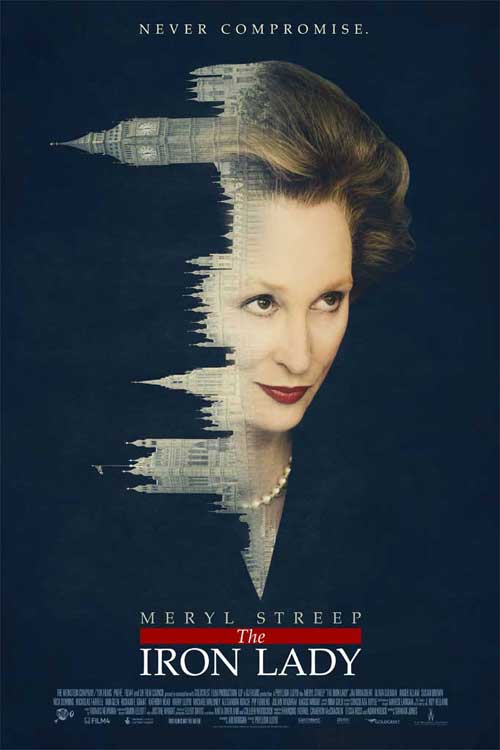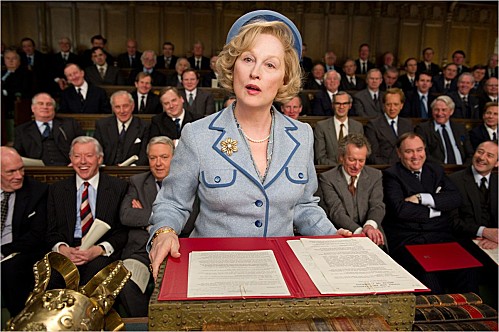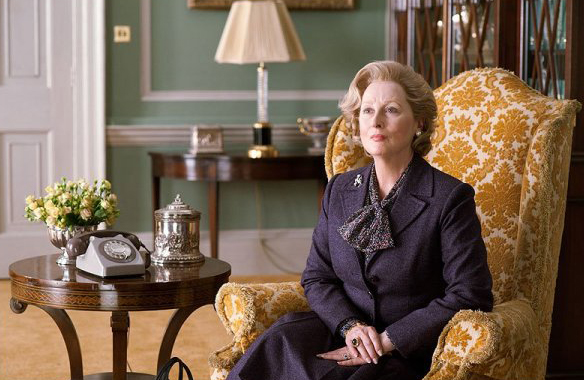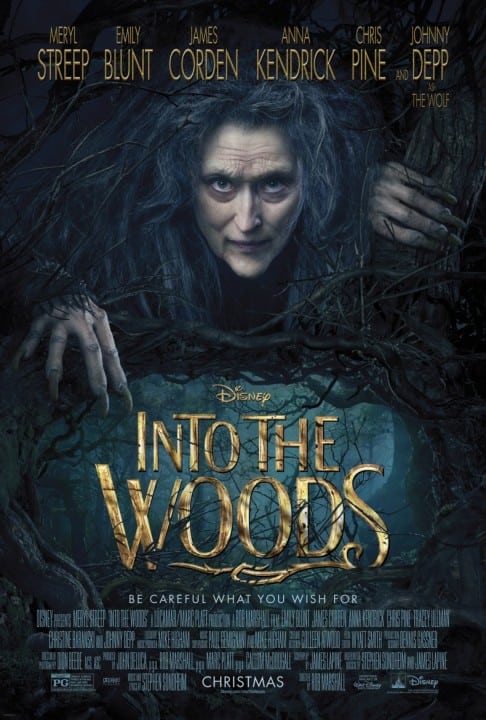The Iron Lady (2011)
Directed by: Phyllida Lloyd
Written by: Abi Morgan
Starring: Jim Broadbent, Meryl Streep, Richard E. Grant
THE IRON LADY
DIRECTED BY: Phyllida Lloyd
WRITTEB BY: Abi Morgan
STARRING: Meryl Streep, Jim Broadbent, Alexandra Roach, Richard E.Grant
RUNNING TIME: 105 mins
DISTRIBUTED BY: 20th Century Fox
REVIEWED BY: Dr Lenera, Official HCF Critic

Margaret Thatcher, Britain’s prime minister from 1979 to 1990, is now old and frail. Suffering from senile dementia, she is constantly imagining that her husband Dennis is still with her. She flashes back to her life, a life which saw her rise up from being the daughter of a shopkeeper to become Britain’s first female prime minister and take controversial decisions, decisions which made her a heroine to those of a Right wing persuasion and a villain to those on the Left……
I am not the kind of person to publically criticise reviews by other people, because I know there are many film writers far better than me. People reviewing the The Iron Lady though, in my opinion, often seem far too keen to let their political views influence their review, something which I am going to attempt to avoid. Then again, it’s quite hard to be objective considering the movie is about such a divisive figure as Margaret Thatcher, a person whose mere mention still inspires strong feelings, from Daily Mail readers who claim she is Britain’s Greatest Prime Minister to Guardian readers who have a bottle of bubbly in the fridge waiting to be opened when she dies. Such a person ought to inspire an interesting, perhaps even incendiary, film, a film that should get people debating furiously as they leave the cinema and go down the pub. Sadly, The Iron Lady is not that film. It’s a curiously misjudged and often tedious exercise that seems to have left most viewers with the sense of a missed opportunity. Before you ask, yes, Meryl Streep is absolutely fantastic. Unfortunately, almost everything else is rather poor.
The film is structured around the elderly Thatcher remembering high points from her career, and this kind of approach can result in quite a moving film, but in this movie it’s just depressing. In fact, at least a third of the film consists of the old lady pottering about her abode imagining her dead husband is with her, and you’ll probably get sick of Dennis popping up all the time. Now senile dementia is something that many of us will have to face in our later years, and I certainly don’t think filmmakers should shy away from it. I believe filmmakers, if they so wish, should be able to confront issues that are upsetting and in doing so maybe help us understand and come to terms with them. But in a film about Maggie Thatcher it just seems wrong. I don’t think that you have to be a Thatcher lover to feel that there’s something morbid and even offensive to dwell on the dementia of someone who is still alive. We also don’t know exactly how bad her condition is at the moment. Perhaps more importantly though, it means that the important stuff, you know, the stuff that inspired the strong feelings about Thatcher, is not given enough time, and we also have the impression of two films of totally differing pace badly glued together.
The film rushes through all the ‘past’ stuff at full speed. The elocution lessons. The Falkland’s War. The Miner’s Strike. The Poll Tax. Much of it is there, but makes little impression. Often events are presented in montage, with much use of real footage of the time and newspaper headlines, but there is no insight into why Thatcher made the decisions she did, nor of the impact of her policies. Many other things are just alluded to, and if you know much about Thatcher you’ll probably pick up on them, but if you don’t you’ll probably miss a great deal. The chief reason she was virtually forced to resign by her party was because of her opposition to any sort of integration with Europe. Now you would think that, because the subject of our country’s relationship to Europe is currently a very important one and one that affects us all, the film would devote a bit of time to this. Sadly, you would be mistaken, because all you get are a couple of lines of dialogue.
The Iron Lady is the worst kind of biopic, mechanically rushing through events with seemingly little thought. I suppose that adapting a neutral view was the safest option, though a part of me thinks that the only successful biopic of Thatcher, the only one that would have some passion behind it, would be one that either lionizes her or attacks her. After all, the impact, whether you feel they are good or bad, of many of the decisions she made is still felt today; there seems to be little middle ground on people’s view of her. The Iron Lady just has no sense of her impact, except as a kind of feminist icon, something I think the real Thatcher would be appalled by. Nor does it bother to get all of its facts right. I am not the sort of person who expects every film to be 100% factual and am willing to forgive a few historical inaccuracies if the film is enjoyable. Braveheart played fast and loose with fact, but it’s an entertaining movie. The Iron Lady is not an entertaining movie, yet still gets things wrong, and I do think that with recent history there should be more attempt to get things right, especially as many people involved are still alive. For example, much is made of Thatcher entering into an all-male world in the House of Commons. Actually, there were women already there, and if this is just a case of deliberate alteration for a certain emphasis, then I doubt Shirley Williams and Betty Boothroyd take kindly to being airbrushed out of history. The same can be said for Norman Tebbit. Like him or loath him, he was virtually Thatcher’s right hand man, and therefore should have appeared in the film.
Director Phyllida Lloyd has little sense of pacing, though there is the good effective directorial flourish, such as a nice transition where the old Thatcher imagines her son Mark running through the house and we follow him to end up in the 1960s. The film’s one major saving grace is, need I say it, Meryl. She is Thatcher. She has it all; the walk, the voice, the mannerisms. She’s fantastic, and is helped greatly by some of the best aging makeup I’ve ever seen in the scenes where she is old. When she delivers speeches, she has that hypnotic feel Thatcher had ; even if what she was saying made you angry, when she spoke, you listened. Sadly Streep can only do so much with a character that, as depicted in the film, does not come across as a fully rounded human being.
Jim Broadbent doesn’t really convince as Dennis and Alexandra Roach, while reasonable as the young Thatcher, is burdened by some especially clumsy scenes near the beginning. Olivia Colman is great as her daughter Carol, and various politicians of the Thatcher years drift in and out usually well played by the likes of Richard E.Grant and Michael Pennington; those well versed in the subject matter will know who they are, but few make much of an impression so I doubt those not in the know will care. Thomas Newman’s score is very fine indeed, musically supporting the emotions of the picture very well; he writes an especially strong, and very lengthy, piece for the Falklands War sequence, giving it some dramatic power that the repetitive images fail to do. For the most part though, this is a major disappointment that smacks of compromise for the most part, and when it doesn’t, is just downright morbid. Then again, would you expect a good film from the director of Mamma Mia?
Rating: 















I agree the film had it’s limitations but it was worth watching due to some of the performances, namely Meryl Streep, Anthony Head and Olivia Coleman. The movie seemed to rush past. I don’t know whether that was because I was enjoying it or that it skimmed over important topics, relying on actual recorded film footage to rush through the action. I would rate it fair to good.
Mmm, I’ve read a number of reviews complaining not much time is given to Thatcher’s decisions, and too much time is spent on her now, struggling with dementia. A real shame as this was another film I was really looking forward to. I have seen clips, and Meryl Streep is staggering, shame about the content.